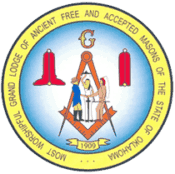Here are some of the more common questions that may arise
Masonry is a fraternity for men. Does this mean my family cannot participate?
No. There are many activities that involve the wives and family members. Dinners, picnics, tours, study groups, forums, entertainment, and many others. There are organizations within the fraternity for women and youth. The meetings that are limited only to members are the business meetings, special meetings, and the degree ceremonies. Masonry is very much a family affair.
My Minister said Freemasonry was a Cult?
Webster defines a cult as “the rites and ceremonies of a religion; or the practice of worshiping a deity or group of deities.” Since Freemasonry is not a religion, but a fraternal association, it cannot be a cult.
Why all the secrets? Isn’t Masonry a secret society?
It was popular in the 1800’s for organizations like the Masons, the Elks, Moose, the Oddfellows to call themselves secret societies. It was a social thing. If you did not belong to at least one “secret society” you simply were not a part of the “in” group. But real secret societies are secret. They try not to let people know they exist. Its fraternal emblem identifies almost every Masonic building. The public is often invited to meetings at Masonic Halls. Masons commonly wear rings and lapel pins identifying themselves as Masons. And it is easy to find books in the library about Masonry.
The oft-repeated answer given by Masons is that Masonry isn’t a secret organization but rather an organization with secrets. In fact, Masonry’s only ‘secrets’ are its modes of recognition.
Any organization which is SO visible in the community and the world can hardly be considered ‘secret’! The buildings used for meetings are generally quite clearly marked for all to find. In many parts of the world, there are even street signs as one enters the city/town/village helping those interested to find Masonic buildings. There are thousands of sites on the Internet, there are listings in phone books, and there are public events held regularly. Secret? Hardly!
Because of the history of Masonry – drawing from the Master Builders of the middle ages – the lessons of brotherly love, fidelity, and charity are taught in an allegorical format which is kept private and is for those who are involved only. The secrecy practiced by Masons today is no more secret than meetings of the Board of Directors of a corporation.
Those opposed to secrecy – for whatever reason – question the need for this, but the simple answer is that it is part of the ‘fabric’ of a nearly four hundred year old organization – and that makes it veryunique.
What does Masonry have to offer that I don’t already get in my civic club?
The purpose is different. Civic clubs exist to give their members a “break” each week from their usual occupations. They generally help their communities with projects of civic improvement. Masonry does these things also, but its purpose is learning and charity. It is mainly concerned with the self-development of men. We know it works because many wives tell us their spouses have become better men, husbands and fathers as a result of their involvement in Masonry.
I’ve heard it is complicated to join Masonry. Why do you have to go through three different degrees?
The process of becoming a Mason is not complicated, but three degrees, or stages of membership, are indeed required in joining. These are learning experiences. It takes time to learn and develop any skill, even the skill of productive living. The degrees of Masonry teach progressive lessons in morals, ethics, and philosophy. To understand these lessons and use them in our daily life requires that we invest some individual time and thought. But that’s what makes being a Mason so special.
If Masonry is such a good organization, why do so many groups today seem to condemn it?
It’s a matter of misunderstanding. Many people have been told the wrong things about Masonry by others who think they know what Masonry teaches, but have not taken the time to actually find out the truth. Spreading the same wrong information to others then perpetuates these myths. Some people sell anti-Masonic pamphlets, videotapes, and books in order to personally profit. They know that hate sells. Some members of the clergy are “coerced” into preaching against Masonry by anti-Masons within their own churches. But groups and organizations that take the time to find out for themselves usually end up as supporters of the fraternity.
Is there any hazing, or horseplay associated with the degrees?
No. The degree ceremonies of Masonry are both serious and meaningful.
I’ve heard that Masonry takes a lot of time. Is this true?
The process of becoming a Mason involves three evenings. There is some homework that goes with each degree that is worked out with another member of the Lodge. But, after a man becomes a Mason, the time he gives to the fraternity is entirely up to him. There is no requirement that a man participate in the meetings and projects of his Lodge. Each man determines for himself the time he wants to give to the fraternity.
